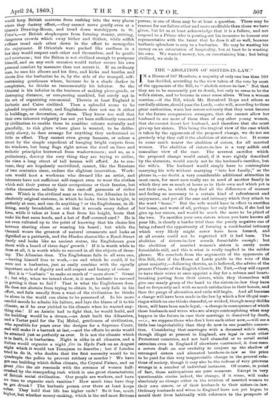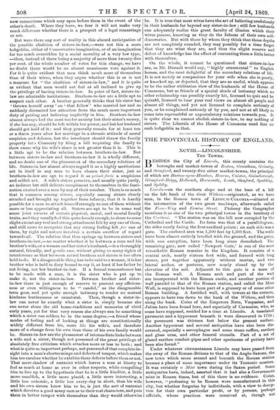THE ABOLITION OF S18TEltS-1N-LA.W."
IN a House of 387 Members, a majority of only one less than 100 has decided, according to the view taken of the vote by most of the opponents of the Bill, to "abolish sisters-in-law." Not that they are to be summarily put to death, but only to oease to be the wife's sisters, and to become in some sense aliens. When a woman marries,—if the Bill, which Mr. Bereaford Hope and others so cordiallyabhors, should pass the Lords, —she will, according to those great authorities, warn her sisters solemnly that they must become for the future comparative strangers, that she cannot allow her husband to see more of them than of any other young women, that she cannot desert her husband, and therefore that she must give up her sisters. This being the tragical view of the case which is taken by the opponents of the proposed change, we do not see precisely why they call it the abolition of sisters-in-/um. It seems to come much nearer the abolition of sisters, for all married women. The abolition of sisters-in-law is a very selfish and masculine view of the case. The severest sacrifice which the proposed change would entail, if it were rightly described by the alarmists, would surely not be the husband's sacrifice, but the wife's. The husband would simply have to contemplate marrying his wife without marrying "into her family," as the phrase is,—no doubt a very considerable additional attraction in most cases, for most men really are in need of another family in which they are as much at home as in their own and which yet is not their own, in which they find all the differences of manner and feeling so necessary to a certain kind of refreshment and enjoyment, and yet all the ease and intimacy which they attach to the word "home." But the wife would have in effect to sacrifice her home, and worst of all, perhaps her only friends, if she had to give up her sisters, and would be much the more to be pitied of the two. To sacrifice your own sisters whom you have known all your life, is clearly a harder trial than the purely negative one of being refused the opportunity of forming a confidential intimacy which very likely might never have been formed, and at all events could not be regretted till it had been. 'The abolition of sisters-in-law sounds formidable enough ; but the abolition of married women's sisters is surely more formidable still, and this is what is really implied in the milder phrase. We conclude from the arguments of the opponents of this Bill, that if the House of Lords yields to the vote of this great majority,—following therein, as is believed, the advice of the present Primate of the English Church, Dr. Tait,—they will expect to have their wives at once appoint a day for a solemn and heartbreaking parting from their sisters, while they themselves will give one manly grasp of the hand to the sisters-in-law they have had so frequently and with so much satisfaction in their homes, and then the pangs of alienation and exile will begin. And all because a change will have been made in the law by which a few illegal marriages which no one thinks shameful, or wicked, though many dislike them, will have been made legal,—a change in consequence of which those husbands and wives who are always contemplating what may happen in the future in case their marriage is dissolved by death, —i.e., we suppose those who don't love each other now,—will see a little less improbability than they do now in one possible connection. Considering that marriages with a deceased wife's sister, though illegal at present in England, are legal in most other Protestant countries, and not held shameful or to entail social ostracism even in England if elsewhere contracted, it does seem a severe draft on our credulity to conjure up the shadow of estranged sisters and alienated brothers-in-law as the price to be paid for this very inappreciable change in the general relations of society, though it may also be the redress of very grievous wrongs in a number of individual instances. Of course, in point of fact, these anticipations are pure nonsense. Except in very questionable circles indeed, the change, if it come, will make absolutely no change either in the relation of married women to their own sisters, or of their husbands to their sisters-in-law. Ordinary husbands and wives in England have not yet begun to mould their lives habitually with reference to the prospects of new connections which may open before them in the event of the other's death. Where they have, we fear it will not make very much difference whether there is a prospect of a legal remarriage or not.
But were there any sort of reality in this absurd anticipation of the possible abolition of sisters-in-law,—were not this a mere hobgoblin, either of Conservative imagination, or of an imagination far too much overridden by a social morality of a very low type, —then, instead of there being a majority of more than twenty-five per cent. of the whole number of votes for this change, we have no doubt there would be an almost unanimous vote against it. For it is quite evident that men think much more of themselves than of their wives, when they argue whether this is or is not a measure for "the abolition of sisters-in-law," and it is quite as evident that men would not feel at all inclined to give up the privilege of having sisters-in-law. In point of fact, sisters-inlaw are admirable institutions. Brothers-in-law are a little apt to suspect each other. A brother generally thinks that his sister has
thrown herself away' on that fellow' who married her and so suddenly distracted her attention from the much more important duty of petting and believing implicitly in him. Brothers-in-law almost always feel the most tender anxiety lest their sister's money, if she has any, should be left within her power, and lest her husband should get hold of it ; and they generally remain for at least ten or a dozen years after her marriage in a chronic attitude of moral suspicion and defence, lest the interloper should throw the family property jut) Chancery by filing a bill requiring the family to show cause why his wife's share is not greater than it is. This is a little apt to be the relation between brothers-in-law. But between sisters-in-law aud brothers-in-law it is wholly different, and no doubt one of the pleasantest of the secondary relations of life. Sisters-in law almost always regard it as a highly meritorious act in itself in any man to have chosen their sister, just as brothers-in-law are apt to regard it ft.. I printet fitcie a suspicious and selfish act. A wife's sisters perceive, and usually quite justly, an indirect but still delicate compliment to themselves in the fascination exerted over a man by any of their number. There is so much that is common among sisters, especially among sisters closely attached and brought up together from infancy, that it is hardly possible for a man to attach himself strongly to one of them without more or less appreciating all. Sisters are apt to be in some real sense joint owners of certain physical, moral, and mental family traits, and they usually feel this quite keenly enough, to share to some slight extent any real and strong attachment felt by any one of them, and still more to recognize that any strong feeling felt for one of them, by right and nature itivolves a certain overflow of regard towards all. The relation that thus springs up between sisters and brothers-in-law,—no matter whether it be between a man and his brother's wife, or a woman and her sister's husband,—is a thoroughly natural, friendly, and gentle one, without giving so many rights of interference as that between actual brothers and sisters is too often held to do. If a disagreeable thing has to be said to a woman, it is her brother who is held in duty bound to say it, at least if her father be not living, not her brother-in-law. If a formal remonstrance has to be made with a man, it is the sister who is put up to make it, not the sister-in-law. Between brother and sisterin-law there is just enough of reserve to prevent any officiousness or even willingness to be " candid," as the disagreeable term goes, and yet quite enough intimacy to render no mutual kindness burdensome or unnatural. Then, though a sister-inlaw can never be exactly what a sister is, simply because she can never share the old home-traditions and memories of vivid early years, yet for that very reason she always can be something which a sister can seldom be in the same degree,—a friend whose modes of feeling and of looking at things are constitutionally widely different from his, more like his wife's, and therefore more of a change from his own than those of his own family would be. Sisters-in-law are the pleasantest of intermediate links between a wife and a sister, though not possessed of the great privilege of absolutely free criticism which attaches more or less to both ; and what is quite as important perhaps, not possessed of that complete insight into a man's shortcomings and defects of temper, which makes him too careless whether he exhibits those defects before them or not. That mere shadow of restraint which leaves a man at liberty to feel as much at home as ever in other respects, while compelling him to live up to the hypothesis that he is a little kindlier, a little more unselfish, a little more placid, a little more interesting, a little less unheroic, a little less every-day in short, than his wife and his own sisters know him to be, is just the sort of restraint which deceives a good many men as to their real characters, and puts them in better temper with themselves than they would otherwise be. It is true that most wives have the art of believing credulouslyin their husbands far beyond any sister-in-law ; still few husbands can adequately realize this great faculty of illusion which theirwives possess, knowing as they do the fulness of their own selfdiscoveries. But with those by whom they think that those depths are not completely sounded, they may possibly for a time forget that they are what they are, and thus the slight reserve and defect of knowledge has the effect of contenting them a little better with themselves.
On the whole, it cannot be questioned that sisters-in-law are, as Mr. Disraeli would say, "highly ornamental" to English homes, and the most delightful of the secondary relations of life. It is not merely as companions for your wife when she is poorly,. or knocked up, or dejected, that they are so useful, which appears to be the rather utilitarian view of the husbands of the House of Commons, but as friends of a special shade of intimacy which no other relationship can possibly exactly hit, licensed to quiz and be quizzad, licensed to hear your real views on almost all people and almost all things, and yet not licensed to complain seriously of you, or be complained seriously of by you, and not at all likely M come into reproachful or expostulatory relations towards you. It is quite clear we cannot abolish sisters-in-law, to say nothing of sisters. The Liberals of the House of Commons need fear no, such hobgoblin as that.































 Previous page
Previous page